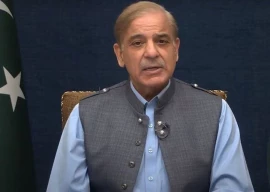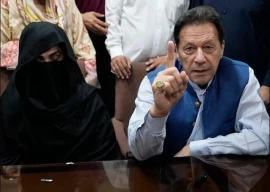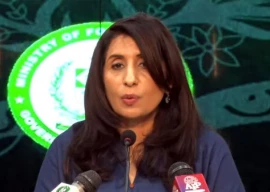Ustad Muhammad Ajmal’s hardened fingertips and calloused palms exude a certain rhythmic history.
After four decades of playing the tabla with prominent artists, witnessing the evolution of television from a single-channel contraption to a remote-flipping phenomena, the transition and glory of Radio Pakistan to the versatility of FM89, from the shiny boots of Ziaul Haq’s regime to the uncertain democracy of the Pakistan Peoples Party, he is at last being recognised for his commitment to music.
Ustad Ajmal was recently nominated for the Pride of Performance award, which is considered as one of the the highest civic awards conferred by the government.
“Music is a quest,” says the 55-year-old tabla maestro in an exclusive interview with The Express Tribune. “Some of the most prominent musical legends have shared on their death beds that they had only just begun to understand its nuances.”
Hailing from Multan, Ustad Ajmal rejected his qawaal background and found himself drawn to the tabla in 1969, when he was part of a musical group from Muslim High School which was selected to perform for the radio. Exposed to the tabla at the radio station, a young Ajmal began to practice at home with a tabla set which his father, Bakshi Salamat Qawaal, bought him.
Listening to the crackling tunes lifting from his old transistor radio; his practice was to translate the rhythms he heard to his hands. However, his formal training began in 1976, when his mentor, Shaukat Hussain Khan, took him under his wing.
Ustad Ajmal’s talent and hard work has earned him a globetrotting record of playing in over 60 different countries with the privilige of performing with a long list of artists such as Naheed Akhtar, Pathanay Khan, Mehdi Hassan, Noor Jahan, Abida Parveen and Nusrat Fateh Ali Khan.
Seated cross-legged on the floor, the sun illuminating the thoughts that poured out of his lips, he shared his experiences of performing at the Prime Minister and President houses and touring the world with dignitaries and political figures like Benazir Bhutto.
“Ziaul Haq used to know us by name,” he explained, adding that while his tyrannical rule may have crippled television and radio, the dictator himself was fond of music and often invited musicians to play for his guests.
The ustad glanced over at his 20-year-old son, Shairi, as he expressed his discontent at the lack of appreciation for musicians, especially within the music industry. According to him, artists not only fail to give any recognition to musicians, “they also deprive us of what we deserve, keeping the bigger cut in payments received after shows”.
Despite 40 years into his career, he lives in a small apartment and feeds his family of four from freelance opportunities. “I don’t want this for my children,” he says. “Shairi and Yawar are both going to university so they can make a decent living but they don’t want to leave music; it is in their genes.”
He also lamented for not being able to practice the tabla at his place due to the fear of his neighbours and expressed sorrow over the fact that classical music, which was once seen as a kind of education, is looked down upon these days.
However, he disagrees with the new trend of commercialisation of classical music and feels if instruments are introduced in schools, the youth could be inspired to preserve their musical heritage. “You cannot inject music in a child but you can turn on the music and give them the freedom to love or hate it.”
Ustad Ajmal will be given the award on March 23. Grateful to the Pakistan National Council of the Arts, Lok Virsa and his colleagues in the industry, the tabla maestro doesn’t see his achievement as an end of a long struggle but as a beginning of a new challenge. “I will dedicate this award to my ustad, Shaukat Hussain Khan,” he said.
Published in The Express Tribune, August 23rd, 2012.






1726732405-0/Express-Tribune-Web-(15)1726732405-0-270x192.webp)










COMMENTS
Comments are moderated and generally will be posted if they are on-topic and not abusive.
For more information, please see our Comments FAQ